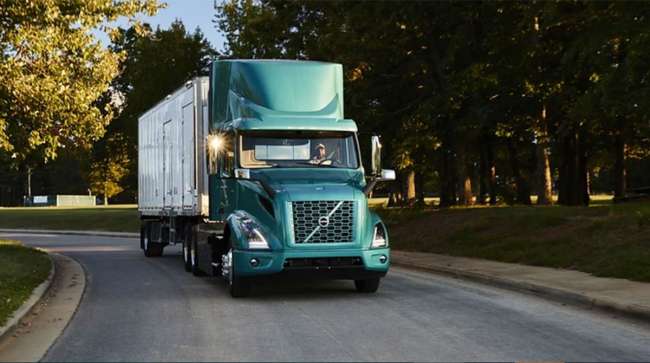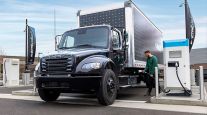Staff Reporter
Uber Freight Launches First Electric Truck Pilot With WattEV

[Stay on top of transportation news: Get TTNews in your inbox.]
Uber Freight announced it is partnering with electric mobility company WattEV and shipping specialist CHEP on a pilot program to deploy EVs on select routes in Southern California.
WattEV aims to lower the barrier to entry for utilizing electric trucks to haul loads. The company is developing charging infrastructure and offers a “truck-as-a-service” model through which it makes available shipping capacity via a network of Class 8 electric trucks. Uber Freight shippers will have access to this shipping capacity as part of the collaboration.
“We know that the long term goal of the whole industry, really, is to decarbonize and EVs are definitely going to be a huge part of that solution,” said Illina Frankiv, head of sustainability at Uber Freight. “So we knew that we needed to position the platform to support the adoption and use of EVs, and we knew that at some point it would be great for us to have experience or start to gain experience in hosting EV capacity on the platform.”
WattEV came along around that time, and the companies discussed the possibility of partnering on a testing pilot. Uber Freight hopes to gain insight into the logistical complexities of electrifying freight transportation. The pilot also is its first deployment of electric vehicles.
Electric trucks are here & we couldn't be more excitedToday, we announced our 1st electric truck pilot, partnering with @wattevinc & @CHEP to deploy electric trucks in California. Alongside shippers & carriers, we'll help drive a more sustainable future. https://t.co/8YNbCXdqLL pic.twitter.com/6NbzqnKmTa — Uber Freight (@UberFreight) February 21, 2023
“We decided that this would be a wonderful partnership for both of us to engage in order to learn what it’s like for us to host EV capacity,” Frankiv said, “but also to enable our product to support smooth operations of EV trucks so that our customers don’t feel a difference essentially, and we can bring this to them as a solution.”

Frankiv
WattEV in return is able to gain access to a new network of shippers. Uber Freight also will be able to share its expertise in terms of optimizing freight networks and maximizing revenue. The pilot is then able to test the expertise from both companies in a real-world setting to collect data.
“This takes a huge amount of sharing between both parties where we share the state of charge of the vehicles, how they perform in various constraints, where our depots are and everything,” WattEV CEO Salim Youssefzadeh said. “And Uber can optimize most of the loads from there. So there is a huge amount of data sharing that goes into this.”

Youssefzadeh
Youssefzadeh wants to drive down the total cost of electric truck ownership by reducing empty miles driven and increase revenue per vehicle. Because of that, he views electric truck adoption as an optimization problem.
“How do we manage the vehicles, and how do we manage the network to get more and more loads?” Youssefzadeh said. “Uber seems like the perfect partner for that because they have this whole brokerage platform where they have the connections to the shippers, they have the route, they have all the data, and we can create that partnership.”
CHEP joined the partnership in early January as the first customer. The pilot was able to reach over 10,000 miles by the time it was announced. Now, with the announcement, it is open for more customers to join. But there are limitations.

Host Mike Freeze speaks with Online Transport's Randy Obermeyer about diagnostics. Hear the program above and at RoadSigns.TTNews.com.
“The pilot is small at this point in time, and it’s definitely growing,” Frankiv said. “[It] is available to our customers with appropriate loads in that region. And I say ‘appropriate’ because the way that we engage with our customers who are interested is, it’s a dialogue right now where we make them aware of the constraints of hauling loads with EVs.”
Frankiv added that those constraints include driving range, the weight and whether the network is an appropriate fit, including where the trucks are operating and are able to charge. Southern California was deemed the best location to start, but there are plans to expand.
“The reason why we started with Southern California is because of the amount of traffic that we already see here going between the ports,” Youssefzadeh said. “And then California in general already has the mandates, incentives and grants to help build infrastructure and to reduce the price of the trucks.”
The reason why we started with Southern California is because of the amount of traffic that we already see here going between the ports.
WattEV CEO Salim Youssefzadeh
CHEP manages, maintains, transports and supplies 330 million pallets and containers that are shared and reused by growers, manufacturers, distributors and retailers. The company is a subsidiary of Australia-based Brambles, which specializes in the pooling of unit-load equipment, pallets, crates and containers.
“This first electric truck pilot in the U.S., in partnership with Uber Freight and WattEV, is a step in the right direction as we move toward a net-positive impact,” said Marisa Sánchez Urrea, director of global supply chain decarbonization at Brambles. “We are proud to partner with our carriers and our customers as we together scale up electrification opportunities and deliver on our shared decarbonization goals.”
Want more news? Listen to today's daily briefing below or go here for more info:




